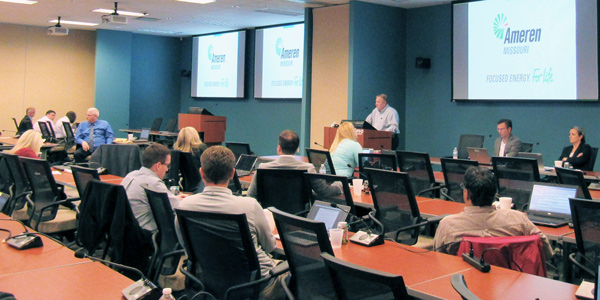By Amanda Durish Cook
CARMEL, Ind. — Ameren Missouri is urging MISO to scrap a newly proposed process for identifying when generators deviate from dispatch instructions, asking the RTO to instead take a more lenient approach.
The new process, which relies on a calculation formulated with help from the RTO’s Independent Market Monitor, would impose a “failure to follow dispatch” warning when a resource fails to move at least half its offered ramp rate over four consecutive dispatch intervals. Generators are currently flagged after they deviate by more than 8% from dispatch signals over four consecutive intervals. (See MISO Invites Feedback on Plan to Curb Dispatch Deviations.)
The utility is asking MISO to instead use an incremental percentage approach consisting of tightening tolerance bands over a period of time — or to delay the project altogether and only focus on generators that deviate from setpoint instructions for an hour straight.
“We understand the concerns with [day-ahead margin assistance payment] and the concerns about not following setpoint instructions,” Ameren Missouri’s Jeff Moore said during a presentation given at an Oct. 12 Market Subcommittee meeting. “However, we believe there should be further discussion on the topic to fully understand the goals of this effort, address concerns of generators that are making good faith efforts to follow setpoint, and possibly explore other alternative proposals.”
Moore suggested that MISO could decrease its 8% threshold to 7%, and then 6%, to test improvement at each stage. He said his proposal maintains the current practice already familiar to generators. He also added that MISO could drop a new calculation altogether and focus on generators that don’t respond to dispatch instructions for at least one hour.
“To us, 60-minute deviations are a bigger problem. They’re not making a good faith effort,” Moore said.
As it stands, MISO’s new calculation could penalize larger units with low ramp rates, he said.
Ramp rates offered by MISO are not always the same over the entire class of generation, Moore said, asking for a “reasonable allowance” for units to respond to setpoint instructions.
“Baseload coal-fired units are not precision instruments,” he said. “The system models are what they are, but I sometimes feel we’re trying to fit a ramp rate with an imperfect machine.”
Moore said large baseload issues can be inundated with “normal” delays: fuel quality issues, feed rates, or problems with valves that can consume ramp rate time and result in a failure to follow dispatch flags.
“These happen when you’re stopping and starting large pieces of equipment,” Moore said. “Some days it may sit there and hum perfectly, and it may only be 2 to 3 MW short.”
Monitor staffer Michael Chiasson pointed out that MISO offers numerous ramp rates for generators to select. “You have 30 different ramp rates to choose from to avoid a homogenous ramp rate,” he noted.
“We aren’t interested in penalizing generators that make a good faith effort. Perhaps if we have examples of what a good faith effort looks like for this class of generator,” Chiasson said, asking large baseload generators to provide scenarios in which normal characteristics of the generator would slow down an otherwise faithful dispatch response. He added that the Monitor isn’t “fast and concrete” on its proposal and the calculation could be tweaked a bit, but argued against gentler treatment of large baseload generators.
“When someone offers a ramp rate, they’re saying they can move those number of megawatts, and MISO should expect it of them. I don’t think we should try and levelize this because, ‘It’s a coal/steam unit; don’t expect much out of it.’… That’s not a comparable standard,” Chiasson said.
He said it would be unfair to owners of fast-moving gas units to allow coal units a watered-down dispatch grace period.
“We’ve been recommending this for a half a decade,” fellow Monitor staffer Michael Wander reminded stakeholders.
MISO Market Quality Manager Jason Howard said the RTO will issue a more detailed uninstructed deviation proposal in November. He also said the RTO will review Ameren’s proposal and stakeholder comments.







